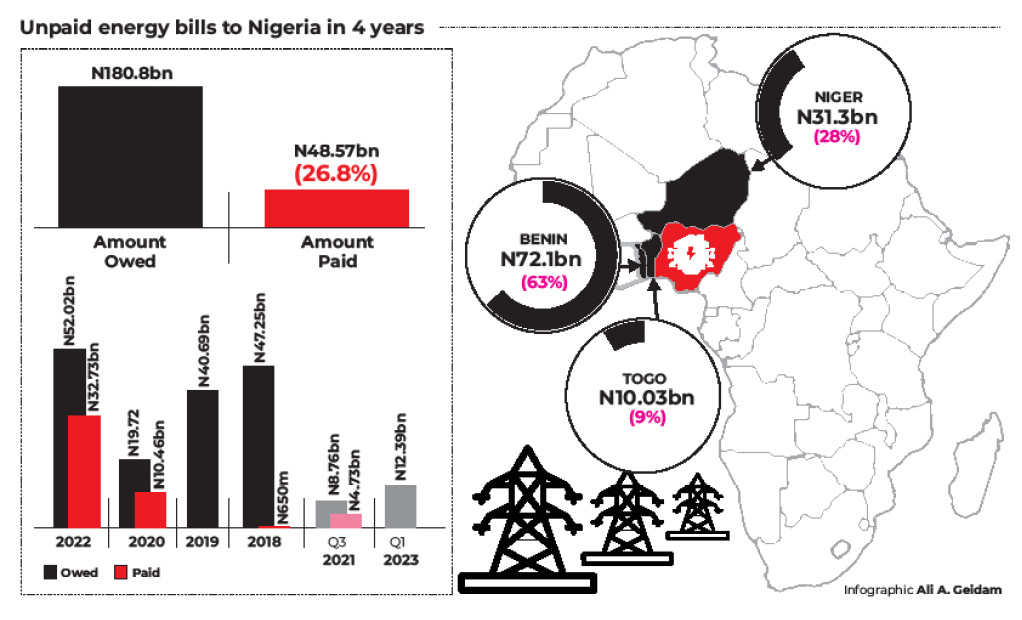Foreign customers in Benin, Togo and Niger have failed to pay over N132.2bn worth of electricity bills supplied to them by Nigeria from 2018 to the first quarter of 2023.
Analysis of quarterly reports produced by the Nigerian Electricity Regulatory Commission (NERC) showed that the amount owed is from the N180.8bn billed to the customers from which they paid N48.57bn, meaning only 26.8 per cent was paid.
The breakdown of the figure showed that Benin topped debtors list with a bill to the tune of N72.1bn through its Société Beninoise d’Energie Electrique (SBEE), followed by Niger Republic with N31.3bn through its Société Nigerenne d’electricite (NIGELEC) and Togo with N10.03bn through its Companie Energie Electrique Du Togo.
On a year-on-year analysis, the countries paid N650m from the N47.25bn given to them, while in 2019, they failed to pay any amount from the N40.6bn.
- NPAN congratulates Edun, Idris as Tinubu swears in ministers today
- NIGERIA DAILY: How Appointment of 131 Women SSAs Will Affect Niger State
In 2020, N10.4bn was paid from the N19.7bn, while in 2022, they paid N32.7bn from N52.02bn. in Q3 2021, the companies paid N4.7bn from the N8.76bn bills given while in the first quarter of 2023, the companies did not pay for N12.3bn bills given to them.
This report did not include the figures for Q1, Q2 and Q4 of 2021 as the NERC report did not disclose the amount of electricity sold to the countries while that of Q3 did not elaborate on what each country owes Nigeria.
Why Nigeria continues to provide electricity despite debt
The report is of the view that the non-remittance of electricity bills by customers of the three continues has become a trend that could lead to sanctions.
NERC had threatened to allow the Market Operations department of the Transmission Commission Company of Nigeria to “invoke the provision of the market rules to curtail the payment indiscipline being exhibited by the various market participants.”
But despite the threat and the huge debt, electricity supply has constantly been supplied to the countries, except for Niger following the recent coup.
According to the Managing Director of TCN, Sule Abdulaziz, the exportation of electricity was due to a country-to-country arrangement that was supposed to generate foreign exchange into the country.
The crux of the agreement was to prevent the countries at the upstream of the River Niger from damming it to allow Nigeria to continue to service its hydropower electricity plants.
The Managing Director of The Nigerian Bulk Electricity Trading (NBET), Nnaemeka Ewelukwa, said Nigeria would be in severe trouble if Niger is allowed to dam the river upstream.
Speaking in response to a parliamentary probe on why Nigeria continues to provide electricity to its neighbours, he had stated that “At the heart of the transactions is the issue of the damming of the river. We have dammed the river and if we don’t provide electricity to countries that are upstream on the river, they can also build their dams which will create a major crisis for the country.”
Despite Nigeria’s goodwill, Niger had made moves to stop its reliance on Nigeria for electricity.
In 2010, the Kandadji hydroelectric dam was awarded to a Russian Company, Zaroubegevodstroï (ZVS), but it was cancelled following delays in 2019 for a project that was meant to be delivered in 2015.
Mahamadou Issoufou, a former President of Niger was quoted to have stated that the project “is not only a question of producing electricity, but also of regenerating the river’s ecosystem, while creating the conditions for local development.
“The work also concerns environmental protection with the displacement and resettlement of populations. What is important here is the growth and development focus in the implementation of the Kandadji programme.”
While the contract is now being carried out by the Gezhouba Group Company Limited (CGGC), the economic sanction placed on the country by ECOWAS has led to the suspension of works as it was not able to secure financing.

 Join Daily Trust WhatsApp Community For Quick Access To News and Happenings Around You.
Join Daily Trust WhatsApp Community For Quick Access To News and Happenings Around You.


